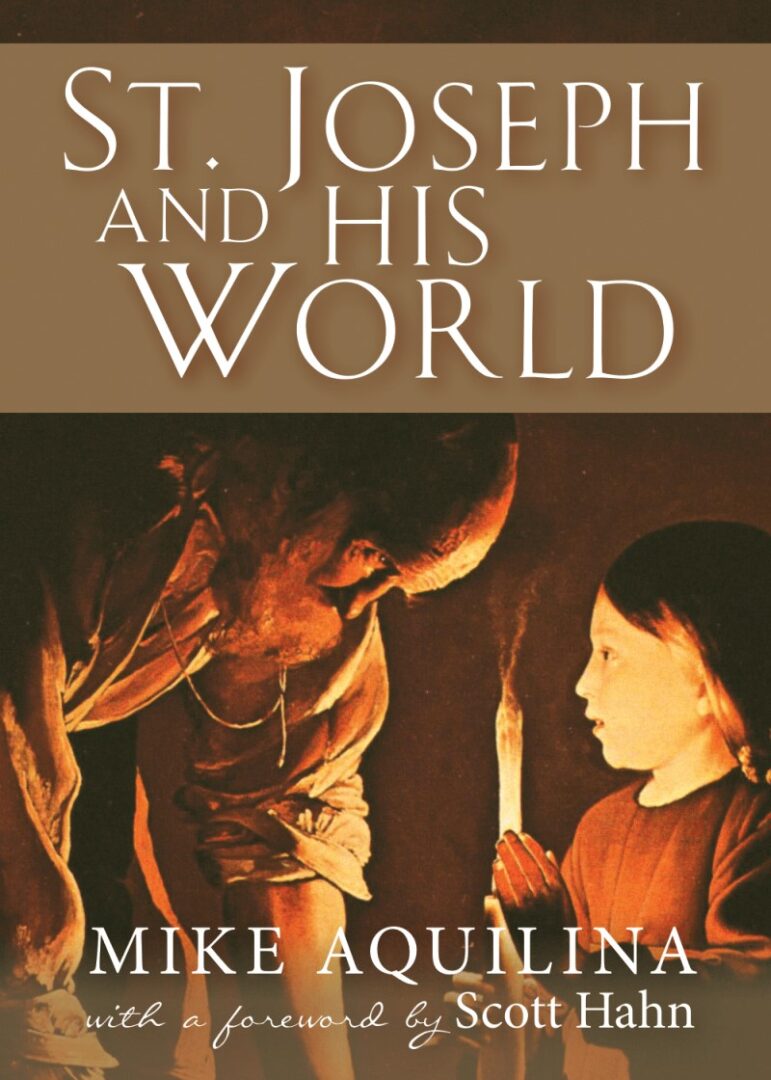We recently concluded the holy year of St. Joseph that was declared by our Holy Father Pope Francis. So on this Christmas-week feast of the Holy Family, as we contemplate the mystery of the birth of Christ, I also want to reflect on his role in the Holy Family of Nazareth and in our current family lives of faith. We have very little detail to go on from Sacred Scripture, so we have to rely mostly on tradition and prayer to meditate on his role. Especially during the holy year, there has been renewed interest and scholarship regarding his role in our spiritual lives. In that regard, I highly recommend a new book entitled St. Joseph and His World by popular Catholic historian and author Mike Aquilina. It is an easy read but elegantly weaves together what we know about St. Joseph from historical research, archaeology and the Jewish and Christian tradition to paint a picture of what life would have been like for the Holy Family with St. Joseph as its head.
The book includes a whole chapter on St. Joseph and his work, which is fitting since Scripture calls him a tekton. Perhaps the best translation for that is craftsman, rather than the customary carpenter, since it is likely he worked with much more than just wood. Here is where it gets interesting, Our Lord Jesus, in His humanity, would have almost certainly stood at the side of his father on earth, carefully watching how he measured, cut, prepared, and analyzed whatever he was building, The Creator of the heavens and earth, the ultimate “Craftsman” of the universe in His divinity, humbled Himself in His humanity to learn from this father on earth how to construct and build!
Aquilina draws out quite a bit about the meaning of work and how it is tied to the sacred. The Jewish people in biblical times were surrounded by cultures that thought themselves far more sophisticated, especially the Egyptians and the Hellenists (Greeks). These cultures had nothing but contempt for manual labor. Many of their leaders even thought that laborers should not be citizens. That kind of work, in their estimation, was just for slaves. But our spiritual ancestors knew better: they honored those who worked with both brains and brawn. This should not surprise us since the holiness of work is built into the core of the Jewish Scriptures. The very beginning of creation is described, poetically, as God doing the “work” of systematically crafting His universe and “resting” on the seventh day, Since man is made in the image and likeness of God, He too is created for sanctifying work. In fact, this is precisely what the Lord commands Adam (man) to do as He commands him to fill the earth and subdue it.
In our modern American culture, we draw a very sharp distinction between work and worship. Like many of the cultures surrounding ancient Israel, we tend to devalue the work of man’s hands, The “real work” by many is considered to be sitting in an office or in front of a computer screen. But that contradicts our Christian tradition: the Sacred Scriptures remind us that God “worked” for six days and then “rested.” As a result, our ancestors knew that work is honorable and exists for giving glory to God in gratitude for all of His gifts, including the gift of life. Work and worship are flip sides of the same coin. In Scripture, there are countless examples of laborers, farmers, shepherds and herdsmen as being those closest to the Kingdom of God. Examples abound of these same offering sacrifice from their work — their crops, their herds, their artifacts — giving the best of what they had back to God. Popular Catholic author Scott Hahn also notices that, when God commands Adam to “till” and “keep” the earth, that these are the exact same words used to describe the sacrifices of the Old Testament priests. In other words, in his work and warship, each father was a “priest” in his own family. All of this gives us insights into how St. Joseph would have raised his Son. As a man given to silence, speaking only when necessary, the Lord Jesus probably heard him speak mostly in prayer at the temple and in instructions for work, consistently weaving together work and prayer.
When we reflect on all these things, our understanding of the Passion of Our Lord (for which He was born in Bethlehem) begins to fall into place as well. Although fully God, Jesus was also fully man. That means he had a human will that had to be trained to work and worship, culminating in the fulfillment of His mission in offering Himself on the Cross. The super physical and spiritual training He received from His father on earth prepared Him for every aspect of His public ministry: the grueling work of walking countless miles through desert terrain (as he probably did with His Father on the way to worksites), attending constantly to prayer, giving Himself over to silence when He needed to converse with His Father in Heaven, and so on.
When the Lord commanded us to charity (Luke 3:11, Matthew 25:45) He would have seen this in the concrete in his father on earth, the just man, who almost certainly attended to the needs of the widows and the poor in Nazareth even after exhausting himself in his work to support the holy family. May we continually turn to the Holy Family of Jesus, Joseph and Mary in prayer, to seek their help in making our families like their own.
